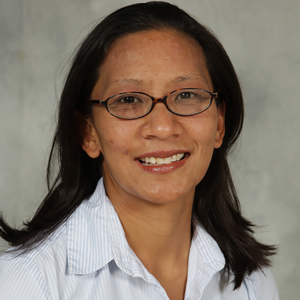Meet Dr. Ferrer
 Dr. Ferrer is an attending physician in the Pediatric Hospitalist Division and the Special Immunology Section of the Infectious Disease Department at CNHS. Currently, she is the Education lead for the newly launched Children’s National Global Health Initiative. She serves as a clinician for the Children’s National Special Immunology clinic caring for children with perinatally- and horizontally-acquired HIV and as a consultant physician for the adolescent Burgess clinic. She is a Global Health Faculty Mentor for CNHS residents and co-director of the Global Child Health Curriculum at CNHS.
Dr. Ferrer is an attending physician in the Pediatric Hospitalist Division and the Special Immunology Section of the Infectious Disease Department at CNHS. Currently, she is the Education lead for the newly launched Children’s National Global Health Initiative. She serves as a clinician for the Children’s National Special Immunology clinic caring for children with perinatally- and horizontally-acquired HIV and as a consultant physician for the adolescent Burgess clinic. She is a Global Health Faculty Mentor for CNHS residents and co-director of the Global Child Health Curriculum at CNHS.
Previously, she served as the Medical Director of the Baylor College of Medicine Bristol-Myers Squibb Children’s Clinical Centre of Excellence in Maseru, Lesotho from 2005-2009 where she assisted with a scale-up of pediatric HIV care and treatment for the country. She has lectured frequently on pediatric HIV, malnutrition, tuberculosis and global health topics in sub-Saharan Africa, Romania, Kyrgyzstan, China and the United States.
Dr. Ferrer’s interest in global health began while in her internship program at Baylor University Medical Center, doing short service trips to Guatemala and Ghana. In her residency at Baylor College of Medicine, Dr. Ferrer traveled to Botswana, helping communities struggling with HIV. Following these experiences, she was recruited to go to Sub-Saharan Africa to address the HIV epidemic, bringing US training and education to rural locations to improve outcomes. Dr. Ferrer’s focus then shifted to Lesotho, and the implementation and improvement of a pediatric HIV program, collaborating with on the ground foundations to get reliable drug supply to the country and establish a system of patient testing, diagnosis, and treatment.
“Physically seeing kids, and then teaching–how to diagnose, start treatment, and remain on treatment,” says Dr. Ferrer, “that is what has fueled my passion for teaching. It is the mentorship of local providers that is going to make the project sustainable.”
Following her four years in Lesotho, Dr. Ferrer became involved in pediatric HIV projects in Romania, Kyrgyzstan, and China. Here, she encountered many of the same challenges as she faced in Lesotho, the largest being accessibility and affordability of antiviral drugs. As Dr. Ferrer readily points out, the majority of the burden of pediatric disease is abroad and is caused by readily treatable illnesses. “The chances of dying before age five are 1/12 in Africa, 1/19 in South Asia, and 1/147 in the US, and most of the deaths abroad are from pneumonia and diarrhea, with malnutrition contributing to about 50%” cites Dr. Ferrer.
However, identifying the solution is the easy part. “What is appealing to me, is that it is not just about the medicine, we know what to do, but about the actual implementation–that is the difficult part,” says Dr. Ferrer. “We know the theoretical, but the practical situation is different. The logistics are what is hard. We need to figure out, how can this be both low cost and effective?”
To address these issues, Dr. Ferrer is focused on training local providers and improving the way healthcare is administered. “Introducing task-shifting, innovating ways to deliver services, and building partnerships and collaborations are so successful to implementation and delivery of care. Having the local partner identify what they need is the most effective, and the best, part.”
In her positions as Education lead for Children’s Global Health Initiatives, Global Health Faculty Mentor for CNHS residents, and co-director of the Global Child Health Curriculum at CNHS, Dr. Ferrer is actively contributing to training the next generation of global health providers while building CNMC’s global health presence. Utilizing her own on the ground experience as well as the knowledge and advice of fellow CNMC providers involved globally, Dr. Ferrer is helping to inform the next generation of global health leaders and educators, for “transforming lives and impacting child and infant mortality globally.”
The biggest objective right now for global health is leveling the playing field, “the reason children are dying of malnutrition and diarrhea is because of their zip code,” says Dr. Ferrer, “everyone identifies this as heartbreaking and quite unfair, but it’s entirely a reality.” This is why education is so critical, to raise awareness and encourage contribution.
Ultimately, though, it’s about building empathy and practicing compassionate care. “I think if you know global health and you understand global health, you become more committed, compassionate, and connected. It really represents our core values.”
“We call it global health,” reminds Dr. Ferrer, “but if you ask people there, it’s just healthcare.”


